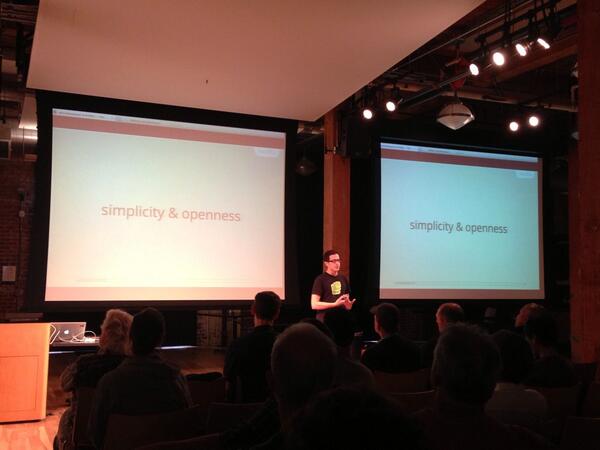microformats2 & HTML5: The Next Evolutionary Step For Web Data at SFHTML5
Details
- When
- from -
- Where
- Adobe, 601 Townsend st., San Francisco, California
- What
- microformats2 & HTML5: The Next Evolutionary Step For Web Data
- Web
- http://microformats.org/wiki/events/2013-07-25-sfhtml5
- http://lanyrd.com/2013/sfhtml5/
- http://www.meetup.com/sfhtml5/events/125476252/
- Etherpad
- https://etherpad.mozilla.org/microformats2
- Slides
- http://tantek.com/presentations/2013/07/microformats2
- Video
- http://youtu.be/kDQigkxyiqE
Add this event to your calendar 
Description
New HTML5 elements and microformats give us a simple way to represent web data without additional URLs, file formats, or callbacks. Microformats2 and HTML5 improvements bring better accessibility, simpler markup, improved semantics, and a direct mapping to JSON APIs for data consumers.
Millions of web sites use microformats to make their data available. Other approaches have emerged as well (e.g. RDFa, microdata, OGP, schema, Twitter Cards). Tantek will discuss which microformats to use for search engines and for public APIs.
Tags
Use the following tags on related content (blog posts, photos, tweets): tags: h5m2 html5-microformats2 html5 microformats2 microformats sfhtml5 townsend-street san-francisco microformats-session microformats-session-2013-07-25
If you use Twitter, mention @microformats in tweets about the event, and track them on Twitter Search.
Attendees
- Tantek Çelik - speaker
- … add yourself here!
Photographs
- Search for photographs from this event on Flickr: Photographs tagged microformats-session-2013-07-25 or for all photographs from microformats sessions.
In rough time sequence order:
Add another photograph from this event here.
Notes
Presentation slides:
Topics:
Notes taken on https://etherpad.mozilla.org/microformats2
Q and A
Questions:
Q: Who is consuming microformats2 in the wild?
- A: Numerous indieweb sites, at least one service (spinn3r) has claimed to consume h-entry as well.
Q: What can we do to get a microformat adopted?
- A: Keep it as simple as possible. Cut your spec and vocabularies in half. Choose about 10 properties at most.
Q: Why are some microformats pushed more and more successful than others?
- A: We publish with multiple formats to see which ones get adopted. We took the subset of the vCard standard that was useful for the hCard microformat. hEntry came from Atom. We tried to be very disciplined to use existing standards as much as possible, benefit from the hard work of others.
Q: What happened to rel-tag?
- A: rel=tag is a published microformat that was originally supported very well by Technorati and IceRocket, neither of which support it any longer. rel-tag lingers but isn't consumed by anyone that we know of anymore. p-category is where tag data seems to be going (e.g. in h-card, h-event, h-review, etc.).
Q: Why is h-product not listed as ready to use today?
- A: All of the microformats2 vocabularies listed on that slide we listed (e.g. h-card, h-entry, h-event, rel-in-reply-to, etc.) are being *consumed* today. We don't know of anyone consuming h-product today. Existing parsers will handle all of these that are currently specc'd out.
Q: How do you markup hidden data? E.g. Different (regional) states that products are available in for instance.
- A: The question is, what do you do with info you want to present globally to a search engine that you wouldn't need to show the user because they come with a context? It's a good question. Hidden information and meta tags tend to get out of sync with actual visible information. So we recommend not to use hidden data if possible, and markup whatever information you *do* have visible in the page or in inputs/selects for both users/browsers and search engines.
Q: Is microdata a classic microformat syntax?
- A: No, it's another format for markup in HTML5 or later. Tends to require much more extra markup. It's a lot less work and code to use microformats.
Q: Should I replace my microdata with microformats?
- A: If you've already finished your microdata markup, then it's less work to just leave it. Add microformats in addition (both classic for the body tag, and microformats2 for all the data on the page for your page API), and that should work fine.
Articles and Blog Posts
Articles and blog posts following up on the meetup. Add a link to your post in the list below:
- 2013-07-24 Peter Lubbers: Looking forward to tomorrow's #sfhtml5 meetup about #microformats with +Tantek Çelik
- 2013-07-25 Peter Lubbers: It's HTML5 <time> +Tantek Çelik talks about #microformats2 at +SFHTML5
- 2013-07-30 Marakana: Microformats with Tantek Çelik
- 2013-08-02 http://christopheducamp.com/w/2013-08-02#microformats
- …
Also, find posts on this meetup on Google Blog Search or Technorati.
Tweets and Testimonials
In time sequence order:
- ...






